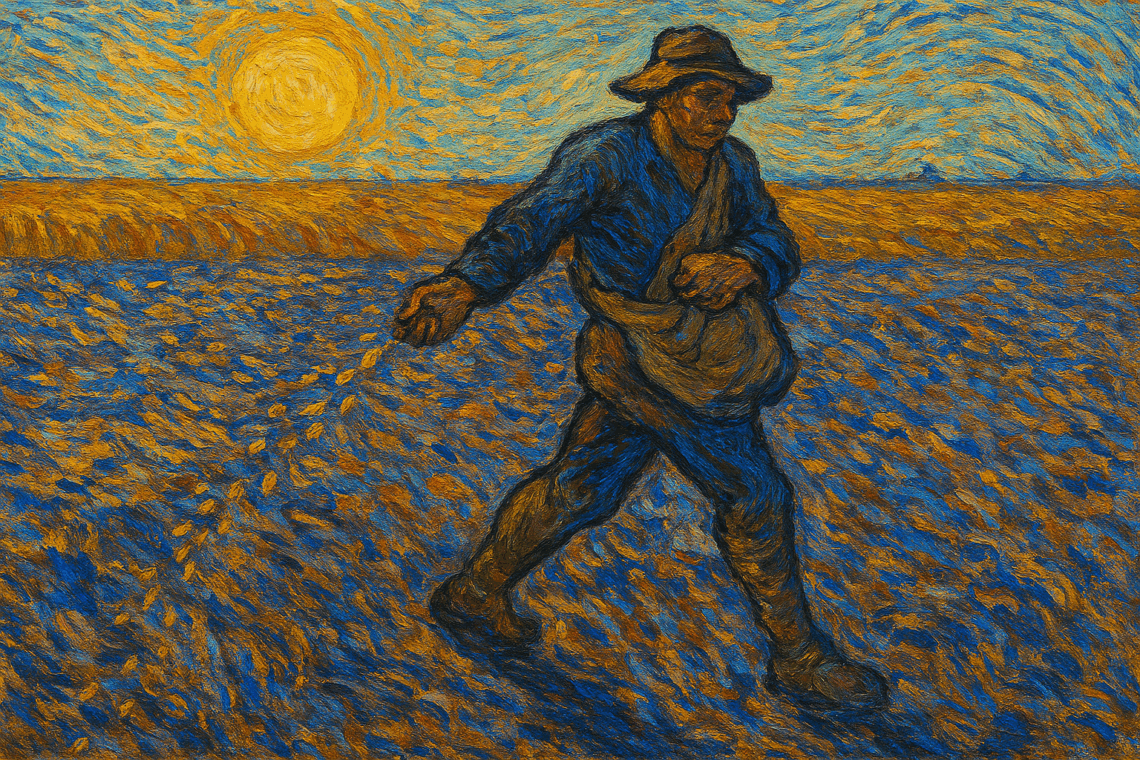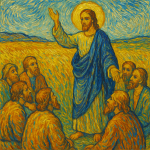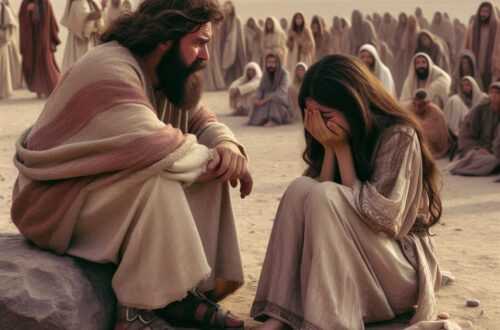
Luke 8,4-15

1. Bible Text – Luke 8:4–15
4 While a large crowd was gathering and people were coming to Jesus from town after town, he told this parable:
5 “A farmer went out to sow his seed. As he was scattering the seed, some fell along the path; it was trampled on, and the birds ate it up.
6 Some fell on rocky ground, and when it came up, the plants withered because they had no moisture.
7 Other seed fell among thorns, which grew up with it and choked the plants.
8 Still other seed fell on good soil. It came up and yielded a crop, a hundred times more than was sown.” When he said this, he called out, “Whoever has ears to hear, let them hear.”
9 His disciples asked him what this parable meant.
10 He said, “The knowledge of the secrets of the kingdom of God has been given to you, but to others I speak in parables, so that,
‘though seeing, they may not see;
though hearing, they may not understand.’
11 “This is the meaning of the parable: The seed is the word of God.
12 Those along the path are the ones who hear, and then the devil comes and takes away the word from their hearts, so that they may not believe and be saved.
13 Those on the rocky ground are the ones who receive the word with joy when they hear it, but they have no root. They believe for a while, but in the time of testing they fall away.
14 The seed that fell among thorns stands for those who hear, but as they go on their way, they are choked by life’s worries, riches, and pleasures, and they do not mature.
15 But the seed on good soil stands for those with a noble and good heart, who hear the word, retain it, and by persevering produce a crop.”
2. Kiki’s Introduction
Hello everyone, I am Kiki. The Chinese name for the second phase of our program is “读经大讲堂”. The English name is “Bible Study.”
We will adopt a relaxed and enjoyable learning style to introduce you to a new world of learning. Each time, I will give a personal summary and analysis from a learner’s perspective, and then Sister Ingrid will help me conduct in-depth learning and discussion with everyone.
I hope that this interesting and interactive process can bring you a new learning experience.
The following is my interview with Sister Ingrid on related issues. Today is the seventeenth lecture on the Gospel of Luke.
Everyone is welcome to leave a message in the comment area for discussion!
3. My Summary of Luke – Seventeenth Study
Well, everybody! First, here is my personal study summary for today.
One day, Jesus told a story about a farmer scattering seed.
Some seeds fell on the path and were eaten by birds. Other seeds landed on rocky soil—they sprouted but died quickly because they had no roots. Some seeds fell among thorny plants that choked the young shoots.
But some seeds fell on good, rich soil and grew into a huge crop—a hundred times more than was planted!
Jesus explained to His disciples that the seed represents God’s message. The different soils show how people respond (this is my understanding; some parts may be wrong):
- Path: Some hear the message but let the devil snatch it away before they believe.
- Rocky ground: Some accept it happily at first but give up when things get hard.
- Thorns: Some start well but get distracted by worries, money, and pleasures, so they never mature.
- Good soil: Some have hearts ready to listen; they keep the message and, by persevering, produce a lot of good fruit—helping others and growing spiritually.
Jesus ended by saying, “If you have ears to hear, listen carefully!”
This parable teaches that it’s not enough just to hear God’s word—you must let it take root, survive challenges, and change how you live.
Now let Sister Ingrid give a further summary.
4. Sister Ingrid’s Comment on My Summary
Hello everybody. The parable of the sower and the seeds is one of the best-known and most important parables in the Bible.
First, it explains our role as Christians: We are called to sow the seed, which is the word of God, and not worry about the result.
God is the Lord of the harvest, so we are only His sowers. But in this work we have to be faithful, because in the Great Commission, Jesus commands us to go and share the word.
It is normal that people refuse the word of God—because out of four types of soil, only one produces lasting fruit. It is sad, but it is the reality. When Jesus talks about the narrow door and the narrow way that leads to heaven, he says that few will go this way.
So we must be careful how we listen and what we do with the word.
5. Questions and Answers (based on Luke 8:4–15)
1. What does the farmer’s seed represent in the parable?
The farmer’s seed represents the word of God—the Bible together with the work of the Holy Spirit. It has within itself the power to grow into a fruitful plant if it falls on good soil that receives it.
2. Why did the seed on the path fail to grow?
The path represents people who are friendly with everyone. When you tell them the gospel, they may reject you or claim they have received it, but in truth they have not.
The devil, who is the loneliest being in the universe because he compromises with no one, takes the word away from them. They may enjoy being around people, but they have no commitment. To follow Jesus, you must commit to Him.
The Bible says that in the last days, people will be like those in the time of Noah: they buy and sell, marry and carry on—but without commitment to God. With hardened hearts, it is easy for demons to snatch away the word.
3. What problem did the rocky soil cause for the seed?
The rocky soil has no depth. A plant without roots may grow quickly after morning rain, but when the sun rises, it withers for lack of water.
Without roots, the plant cannot survive storms or heat, so it dies.
Recently, I have seen many who became Christians at the same time I did return to their old life, and I have wondered why. Sometimes a plant grows in a little soil over rock—you don’t realize the rock is there until you see that no fruit is produced.
4. How did the thorns affect the plants that grew among them?
Thorns did not exist at the beginning of creation—they are part of the curse after Adam and Eve sinned. In this parable, the thorns represent two things that were also not part of the beginning: poverty and riches.
In Eden, Adam and Eve had everything and did not need to desire more, but Eve was deceived by the serpent. Poverty and riches both tempt us to focus on money instead of God as our provider. That is why Jesus says in Matthew that we should first seek the kingdom of God and His righteousness, and all other things will be added to us.
5. What made the seed on good soil different from the others?
The good soil received the seed, and it grew and produced fruit in due time.
6. In the parable, who do the birds represent?
The birds represent the evil spirits around us. Their only intention is to destroy the work of God’s farmers.
7. What does “fruit” mean in the context of this parable?
When the Bible talks about fruit, it includes the fruit of the Spirit described in Galatians 5: love, joy, peace, patience, kindness, goodness, faithfulness, gentleness, and self-control.
8. How can we make our hearts like the “good soil”?
The Bible often calls us to examine ourselves. We need a willing spirit that desires to obey God’s word. We must remove anything that hinders us from walking the narrow way to heaven. We cannot love wealth and God at the same time.
9. Why is it not enough just to hear God’s word according to Jesus?
Jesus said that people’s hearts have become dull from constant hearing without action. Some keep learning but never put it into practice.
Followers of Jesus are on a narrow road to heaven, facing many troubles. We must do what Jesus says to overcome them. The Bible teaches that being a Christian is a lifelong pilgrimage. We are to work out our salvation with fear and trembling, and to seek peace and sanctification so that we may see the Lord.
10. Can you think of a time when you were like one of the soil types? Which one, and what did you learn?
When I first heard the Gospel, I was like the rocky soil—I received the word with great joy. But then I realized that the kingdom of God is not constant joy; it is a battle between good and evil, and we are called to bear fruit.
Later, another seed fell into good soil in my heart, and now I expect, over time, to bear more and more fruit.




